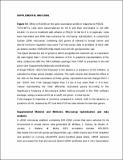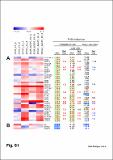Por favor, use este identificador para citar o enlazar a este item:
http://hdl.handle.net/10261/113957COMPARTIR / EXPORTAR:
 SHARE SHARE
 CORE
BASE CORE
BASE
|
|
| Visualizar otros formatos: MARC | Dublin Core | RDF | ORE | MODS | METS | DIDL | DATACITE | |

| Título: | Progesterone induction of the 11β-hydroxysteroid dehydrogenase type 2 promoter in breast cancer cells involves coordinated recruitment of STAT5A and progesterone receptor to a distal enhancer and polymerase tracking |
Autor: | Subtil-Rodríguez, Alicia CSIC; Millán-Ariño, Lluis CSIC; Quiles, Ignacio; Ballaré, Cecilia; Beato, Miguel; Jordan, Albert CSIC ORCID | Fecha de publicación: | jun-2008 | Editor: | American Society for Microbiology | Citación: | Molecular and Cellular Biology 28(11): 3830-3849 (2008) | Resumen: | Steroid hormone receptors regulate gene expression, interacting with target DNA sequences but also activating cytoplasmic signaling pathways. Using the human 11β-hydroxysteroid dehydrogenase type 2 (11β-HSD2) gene as a model, we have investigated the contributions of both effects on a human progesterone-responsive promoter in breast cancer cells. Chromatin immunoprecipitation has identified two different mechanisms of hormone-induced progesterone receptor (PR) recruitment to the 11β-HSD2 promoter: (i) direct PR binding to DNA at the proximal promoter, abrogated when PR contains a mutated DNA binding domain (DBD), and (ii) STAT5A (signal transducer and activator of transcription 5A)-mediated recruitment of PR to an upstream distal region, impaired by AG490, a JAK/STAT pathway inhibitor. The JAK/STAT inhibitor, as well as expression of dominant-negative STAT5A, impairs hormone induction of 11β-HSD2. On the other hand, the DBD-mutated PR fully supports 11β-HSD2 expression. These results, along with data from a deletion analysis, indicate that the distal region is crucial for hormone regulation of 11β-HSD2. We show active RNA polymerase II tracking from the distal region upon PR and STAT5A binding, concomitant with synthesis of noncoding, hormone-dependent RNAs, suggesting that this region works as a hormone-dependent transcriptional enhancer. In conclusion, coordination of PR transcriptional effects and cytoplasmic signaling activation, in particular the JAK/STAT pathway, are critical in regulating progestin-induced endogenous 11β-HSD2 gene expression in breast cancer cells. This is not unique to this promoter, as AG490 also alters the expression of other progesterone-regulated genes. Copyright © 2008, American Society for Microbiology. All Rights Reserved. | Versión del editor: | http://dx.doi.org/10.1128/MCB.01217-07 | URI: | http://hdl.handle.net/10261/113957 | DOI: | 10.1128/MCB.01217-07 | Identificadores: | doi: 10.1128/MCB.01217-07 issn: 0270-7306 |
| Aparece en las colecciones: | (IBMB) Artículos (CABIMER) Artículos |
Ficheros en este ítem:
| Fichero | Descripción | Tamaño | Formato | |
|---|---|---|---|---|
| Subtil-MCB-2008-v28-n11-p3830.pdf | 2,08 MB | Adobe PDF |  Visualizar/Abrir | |
| Subtil-MCB-2008-v28-n11-Supplementary-1.pdf | 83,22 kB | Adobe PDF |  Visualizar/Abrir | |
| Subtil-MCB-2008-v28-n11-Supplementary-2.pdf | 147,13 kB | Adobe PDF |  Visualizar/Abrir |
CORE Recommender
PubMed Central
Citations
20
checked on 02-abr-2024
SCOPUSTM
Citations
33
checked on 08-abr-2024
WEB OF SCIENCETM
Citations
32
checked on 26-feb-2024
Page view(s)
408
checked on 16-abr-2024
Download(s)
419
checked on 16-abr-2024
Google ScholarTM
Check
Altmetric
Altmetric
Artículos relacionados:
NOTA: Los ítems de Digital.CSIC están protegidos por copyright, con todos los derechos reservados, a menos que se indique lo contrario.
